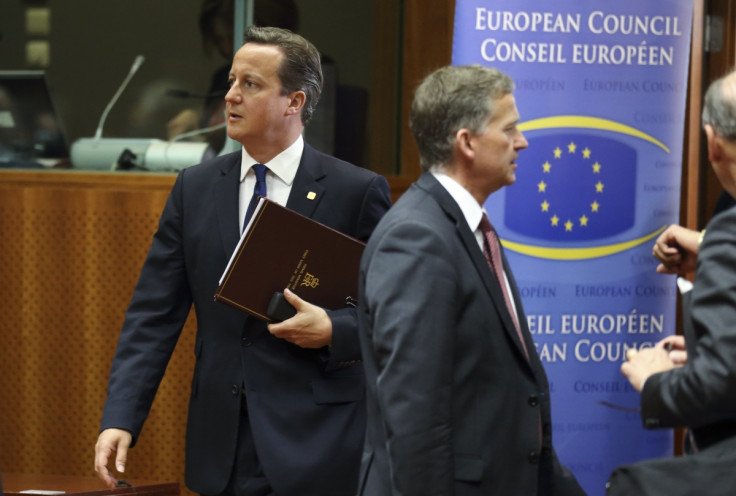David Cameron's 'Hypocrisy' Over Russia Sanctions Underlines European Union Rift

David Cameron has been accused of hypocrisy after he attempted to cast himself as the dominant European Union figure pressing reluctant allies to step up to the plate with wide-ranging sanctions against Russia.
The day after he demanded the French scrap plans to export two warships to Russia, which he branded "unthinkable", he was met by an angry response from the ruling Socialist party over his own lack of action.
The attack came as EU foreign ministers meeting in Brussels agreed tougher sanctions on Russians including travel bans and asset freezes, with hints there might be more to follow.
Cameron's tough words on Putin belied by total failure to tackle dirty Russian money in London.
The head of France's ruling socialist party, Jean-Christophe Cambadelis, claimed the row over the warships was "a false debate led by hypocrites".
"When you see how many [Russian] oligarchs have sought refuge in London, David Cameron should start by cleaning up his own backyard," he said.
Labour's Ben Bradshaw struck a similar note, tweeting: "Cameron's tough words on Putin belied by total failure to tackle dirty Russian money in London."
He was also critical of the fact the government had waited until now to launch a full judicial inquiry into the death in London of ex-KGB spy Alexander Litvinenko eight years ago.
While it is roundly denied by Downing Street, the decision to finally launch an inquiry into the incident appears to be aimed squarely at the Kremlin as a sign of resolve. And, in any case, it has already been interpreted that way.
But attention was focused on to the UK government's own actions after Cameron urged other leaders to toughen existing measures against the Kremlin to include trade, arms sales and financial measures.
While the other leaders are clearly ready to go further than the existing sanctions, there is no sign they are yet ready to escalate the measures to the point where Russia could retaliate in a way that could damage the fragile EU's economic recovery.
The fact that countries such as Germany, France and Italy are hugely reliant on gas supplies from Russia - while the UK buys only minuscule amounts - indicates the sort of retaliation they fear.
It is clearly the case any severe financial measures that could hit Russian investment into the UK would have far-reaching consequences. It may be that Russia could only lose such an economic war but plenty of damage could be done before that happened.
EU leaders will be concerned the slowly recovering Eurozone could easily be pitched back into crisis if there was a tit-for-tat war and, they point out, Britain is not in the euro so it would, to some extent, be immune.
And, in any case, it remains unclear precisely what Cameron has in mind when he talks about the UK having to "take a hit".
It may be he has accepted the fact that such measures would have a significant impact on the financial institutions but it might be the case that he wants to stop short of that, preferring bans on arms exports and energy import, which would affect the UK far less.
And that's the suspicion that is undoubtedly driving the reaction in France and elsewhere.
© Copyright IBTimes 2025. All rights reserved.






















